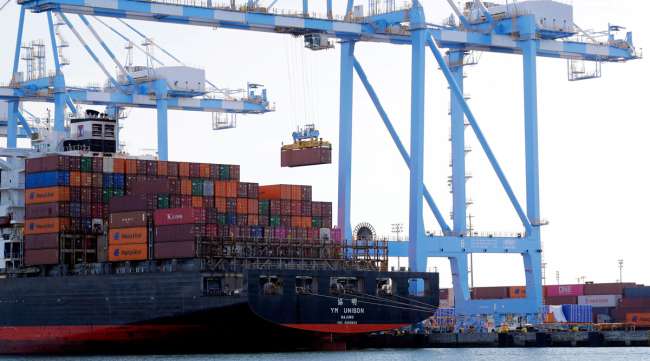Associated Press
US Trade Deficit Drops for First Time in Six Years

[Stay on top of transportation news: Get TTNews in your inbox.]
The U.S. trade deficit fell for the first time in six years in 2019 as President Donald Trump hammered China with import taxes.
The Commerce Department said Feb. 5 that the gap between what the United States sells and what it buys abroad fell 1.7% last year to $616.8 billion. U.S. exports fell 0.1% to $2.5 trillion. But imports fell more, slipping 0.4% to $3.1 trillion. Imports of crude oil plunged 19.3% to $126.6 billion.
The deficit in the trade of goods with China narrowed last year by 17.6% to $345.6 billion. Trump has imposed tariffs on $360 billion worth of Chinese imports in a battle over Beijing’s aggressive drive to challenge American technological dominance. The world’s two biggest economies reached an interim trade deal last month, and Trump dropped plans to extend the tariffs to another $160 billion in Chinese goods.
In part one of a two-part exploration of autonomous technology today, our latest RoadSigns podcast revisits conversations with CEOs Alex Rodrigues of Embark and Cetin Mericli of Locomation. Hear them explain what testing automated trucks and developing platooning technology has taught them about the road ahead — and get new perspective with host commentary. Listen to a snippet from Rodrigues above, and to hear the full episode, go to RoadSigns.TTNews.com.
But goods trade gap with Mexico rose 26.2% last year to a record $101.8 billion. The goods deficit with the European Union also hit a record, $177.9 billion — up 5.5% from 2018.
Overall, the United States posted a $866 billion deficit in the trade of goods such as cars and appliances, down from $887.3 billion in 2018. But it ran a $249.2 billion surplus in the trade of services such as tourism and banking, down from $260 billion in 2018.
Trump campaigned on a promise to reduce America’s massive and persistent trade deficits, which he sees as a sign of economic weakness and the result of lopsided trade deals that put U.S. exporters at a disadvantage. He has negotiated a new trade agreement with Canada and Mexico that he says will bring more balance to trade in North America.
Mainstream economists argue that trade deficits are largely the result of a big economic reality that doesn’t respond much to changes in trade policy: Americans spend more than they produce, and imports fill the gap.
In December, the overall trade gap widened 11.9% to $48.9 billion as exports rose 0.8% to $209.6 billion and imports climbed 2.7% to $258.5 billion.
Want more news? Listen to today's daily briefing:




